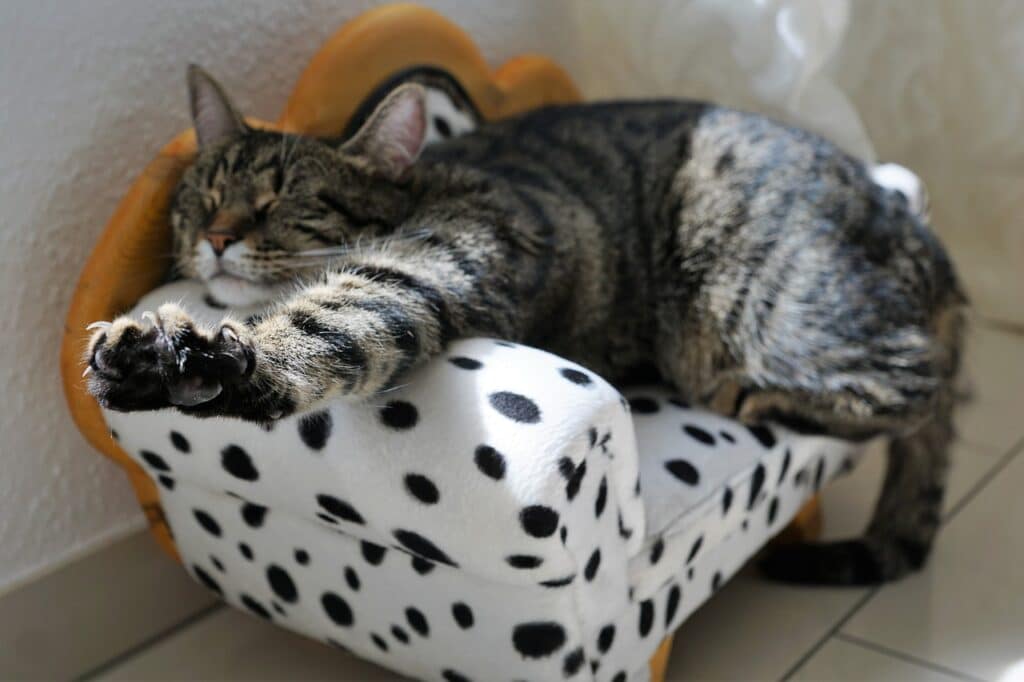You watch your cuddly kitty every day of her life, so you know her every step. One day, when she is in her teens, you notice she is not as spry as usual. At first you attribute this to her growing age, but then you notice that she isn’t grooming herself as much as usual and is more reclusive. You take her to your veterinarian and discover that she has been dealing with arthritis.
Your senior cat may suffer the pain of arthritis without indicating it to you overtly. The earliest signs that your cat is feeling arthritic pain are often behavioral. This includes litter box avoidance because the box is difficult to get into and out of, lack of grooming herself because she can’t reach certain areas of her body (if her spine or hips are affected), and reclusive behavior. Cats in pain may also be more irritable.
What is arthritis in cats?
The terms arthritis, osteoarthritis, and degenerative joint disease (DJD), are often used interchangeably, and each indicates an inflammation of the joints. Although many things – such as injury or infection – can cause arthritis, most cases are simply due to aging. As cats age, the normally smooth cartilage surfaces of the bones erode and wear thin. As this erosion takes place, the body repairs it, but the new surface becomes increasingly irregular, or may be incomplete. These surface changes in the joint cause pain and additional inflammation when the bones meet each other.
Large joints, such as the shoulder, elbow, hip, and ankle are the most frequently affected. However, all joints, including those of the spine, can be involved. Obese cats tend to be especially prone to arthritis, as excess weight places a greater strain on joints.
Most geriatric cats will experience some degree of arthritis and exhibit symptoms including stiffness, pain, and loss of muscle. Arthritis is a progressive disease, meaning symptoms usually worsen with age.
SIGNS YOUR CAT MAY HAVE ARTHRITIS
Depending upon the amount of pain your cat is experiencing, there may be changes in appetite and behavior (e.g., your cat may go off by herself more often). The joints are generally not swollen, and the pain is the dull aching type, so cats rarely vocalize or cry out in pain. Some cats will lick or bite at the painful area. Some will seek out warmth or soft places to sleep.
Other signs include:
- Stiffness, limping, or favoring a limb – particularly after sleep or resting
- Altered gait (the way in which your cat walks)
- Muscle atrophy (reduction in the size of the muscle) in the affected limb
- Difficulty getting up after lying down
- Inability to jump up (onto a chair or windowsill) or negotiate stairs
Arthritis and its accompanying symptoms are not life threatening, but
they often worsen throughout your cat’s life. Many cats simply live
within the limitations caused by arthritis. For many, treatment can improve the quality of life.
HELPING YOUR CAT DEAL WITH ARTHRITIS
Degenerative joint disease can be treated medically and surgically. Reducing inflammation and pain management are the keys to preserving a good quality of life for your cat. There are few anti-inflammatory drugs that can be given to cats, so veterinarians often recommend a nutraceutical containing glucosamine or other ingredients.
You can also do a lot in your home to help your arthritic cat access her favorite spots comfortably. Make sure food bowls are easily accessible. Choose litter boxes that are large, easy to get into and out of, and place them in the living area where your cat spends the most time. For instance, if your cat dwells mainly on the first floor, don’t put the litter box in the basement. Use a pet ramp or stair steps to help her access a favorite perch or warm space.
See your veterinarian if you suspect your cat has arthritis. Each cat with arthritis will need a management program specifically designed for her needs. Watch your cat and work with your veterinarian to determine what is best for your cat.
How to make your arthritic cat more comfortable:
- If your cat is overweight, try feeding a lite cat food to help your cat lose weight and reduce strain on joints.
- Anti-inflammatory drugs, as prescribed by your veterinarian, may help reduce pain. Do not give your cat over- the-counter medications such as aspirin or acetaminophen.
- Try to make the basics of your cat’s life as simple as possible. Offer your kitty a soft, warm place to sleep, such as a Cozy Cushion®, or a heated bed like the Lectro Soft Heated Pad. Consider our Stair-Steps for easier access to secure places, or a feeder that is slightly elevated to help make mealtime more comfortable. And make sure the litter box is easily accessible, with a low-rise entrance, like the Catty Corner litter box.

